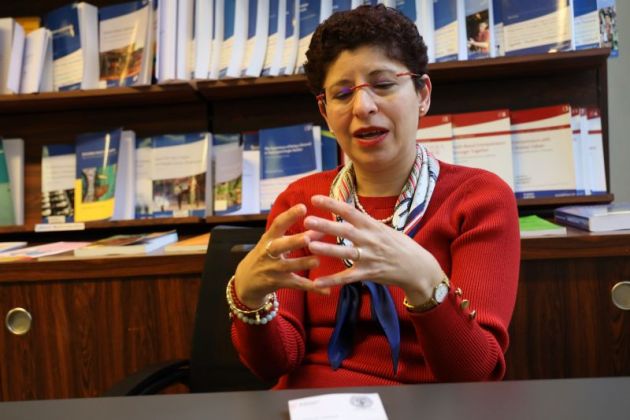United Nations' attitude has changed to faith-based organizations in recent years, says UN adviser

Azza Karam knows about the intersection of faith-based organizations with United Nations agencies, the non-governmental organization sector and governments, saying it has changed over the past 10 years with much more interaction now.
Karam's day job is as a senior adviser on social and cultural development for the United Nations Population Fund in New York, and she is also a professor at Amsterdam's Vrije Universiteit.
As a responder to two lectures delivered on June 11 at the start of the five-day "Building Bridges" seminar at the World Council of Churches in Geneva, Karam challenged some of the approaches of the intergovernmental and non-governmental sectors in dealing with faith-based organizations.
In an interview with the WCC, Karam said she is a Muslim believer, and that she was not criticizing interfaith encounters, instead "work on religious engagement that takes places mainly within government and intergovernmental settings.
"I am criticizing some of the work on religious engagement that takes place within faith-based non-governmental organizations, but not interfaith encounters per se, because they're in so many diverse forms, and that is not the space I am particularly worried about.
'WORRIED ABOUT DOING RELIGION'
"I am worried about the 'doing religion', that is now becoming a business in the marketplace," she said.
Nearly 20 years ago, Karam had started the work of the United Nations in engaging with faith-based organizations, when UN agencies seemed to steer clear of engaging with them.
"We started this work in 2000, but it took off quite intensively in 2007. So, I am looking at it as someone who has seen the pendulum swing.
"Now we have gone to the other extreme....We have made it into a marketplace."
Her response at the WCC was to Building Bridges lectures by professors Rosalee Velloso Ewell from the United Kingdom's Redcliffe College and Tuba Işik from Germany's University of Paderborn.
Isik was unable to attend, and her address was read by Dr Muna Tatari from the same university who spoke on the theme.
The seminar, under the theme "Freedom: Muslim and Christian Perspectives," is sponsored and organized by Georgetown University, the oldest Roman Catholic and Jesuit affiliated institution of higher education in the United States.
Some years ago, Karam became "a member of the Building Bridges journey, because that is what it is. It is not an event; it's a process".
'BASED ON SCRIPTURE'
"It is a very learning-infused process. Building Bridges provides a space for those who are seekers. I call them seekers, people who are trying to find God in what we do. I like the process very much because it is based on scripture.
"They select scripture from both Muslim and Christian texts, and we sit down, and we study together," explained Karam.
Despite her criticism of some of the interaction with faith-based organizations, Karam said that interfaith encounters are "to be cherished in particular ways, not only because they're religious, but to be cherished because it's part of civic engagement."
"We need to reckon with civic engagement because that is where the quintessential accountability of governance lies. It is with citizens. It is important to ensure that there should be a powerful civic space," and faith-based organizations should be in that space.
In the past, most interactions with governments tended to focus on secular actors.
"What is to be cherished is that we see the religious actors are part of that space, and it is important how we continue to nurture this space," she said, "and we need to be in that civic space.
'MUTUAL ACCOUNTABILITY'
"It's mutual accountability....Putting religion in some moral stratosphere is not a good idea. History is replete is with instances because they are human too, religious actors can make plenty of mistakes in the name of the divine.
"I don't want to see a repeat of that...when we are untouchable and beyond reproach. But would like to have religions as accountable as other civic entities, and not as moral judges."
The Building Bridges meeting looked at what freedom is, who it is for and who gives that freedom and that is "quintessentially about accountability".
Actors had spoken about the relationship to God as one of the ways they could find freedom.
"We heard that freedom has a relations dynamic" relating to whether Muslim or Christian freedom has a relations dynamic with God and what the relations with God are about," said Karam.
"If that is the kernel, it calls into the question our relationships with one another as human beings whether we are of different faith traditions or if we don't adhere to any monotheistic faith tradition.
"It calls into question our relations with one another, as men and women and herein coming to the point about where feminism and gender and so are. If we believe freedom is relational, then all relations matter, including between the different traditions."